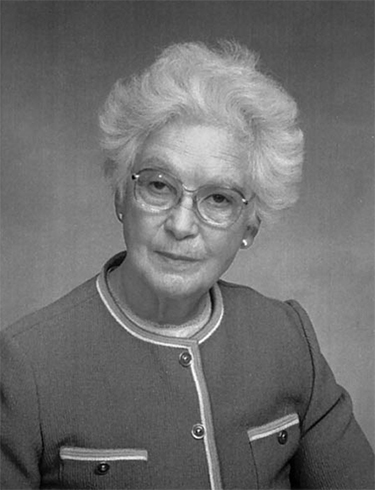Helen Clark: a giant in human nutrition and metabolic research
Written by: Angie Klink

Helen Clark
In 1974, Helen E. Clark, groundbreaking early nutrition science researcher, would become the first woman to be recognized as a distinguished professor at Purdue University. Later, Purdue would award Clark an honorary doctorate in 1994.
Helen E. Clark was an assistant professor of foods and nutrition at Kansas State University (1950-54) before joining the Nutrition Science faculty at Purdue University where she stayed until her retirement (1954-77). She established a human nutrition research metabolic unit at Purdue in a time when few institutions had such a component. She was on the cutting edge of metabolic research on human requirements of protein and amino acids, and her investigations were part of what came to be known as the Green Revolution.
Clark’s research focused on two amino acids, lysine and methionine, which were critical in low- and middle-income countries where the primary sources of proteins were cereals and legumes. Clark’s findings unveiled many of the mysteries related to lysine that led to more effective use of plant proteins. Her research to genetically improve cereals and legumes contributed to both basic nutrition knowledge and to the solution of world food problems. [1]
Purdue had first announced its discovery of high-lysine corn as a valuable livestock feed in 1963. High-lysine corn has about the same amount of protein as “normal” corn, but the quality of protein is substantially better. Clark conducted feeding studies that showed high-lysine corn held exceptional promise in human nutrition and could be effectively digested by humans. [2]
Clark’s research helped to solve the problem of adequately feeding the exploding world population by determining that protein balance could be maintained with consumption of various types of foods containing no animal protein. Since meat was a scarce commodity for much of the world, the findings were groundbreaking. She read the report she co-authored with two faculty colleagues and a graduate student at the fifth International Congress on Nutrition in Washington, D. C., in September 1960. [3]
Clark was a woman of many firsts. She participated in the first White House Conference on Food, Nutrition and Health in 1969. The following year, she served as the only female member of a committee appointed jointly by the U.S. Department of Agriculture and the National Academy of Sciences to make recommendations concerning research in food science and nutrition.
Part of Clark’s June 1968 acceptance speech for the Borden Award, an achievement award for contributions that advance poultry science, reflect the energy of today’s College of Health and Human Sciences.
“Nutrition research can improve the well-being of man, in this nation and around the world, but only if it is interpreted in a reliable and meaningful way and if people are motivated to apply its findings,” Clark said. “The new knowledge from the root of research must rise through the trunk and spread through the branches to be used by people everywhere. This is one of the great challenges of our time.” [4]
Helen Clark’s research on adult requirements for lysine has been used by national and international policymakers to formulate changes for better nutrition that benefit world food problems. Her groundbreaking work in protein metabolism and amino acids is still referenced by researchers today. Clark was honored as a fellow by the American Society for Nutritional Sciences in 1979.
[1] Ibid, 1774.
[2] “New Corn Described As Human Food Boon,” Box 5, UA 15, College of Health and Human Sciences Records, Virginia Kelly Karnes Archives and Special Collections Research Center, Purdue University Libraries.
[3] “Nutrition Experiment Explained,” Journal and Courier, September 5, 1960, 13. www.newspapers.com.
[4] Helen E. Clark, Remarks, Borden Award, June 27, 1968, Box 4, Folder 7, HSF 502, Avanelle Kirksey Papers, Archives and Special Collections, Purdue University Libraries.
Discover more from News | College of Health and Human Sciences
Subscribe to get the latest posts to your email.